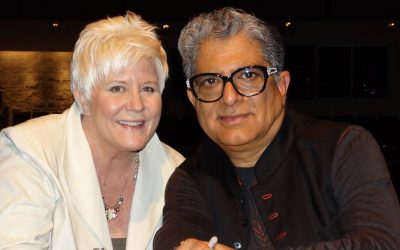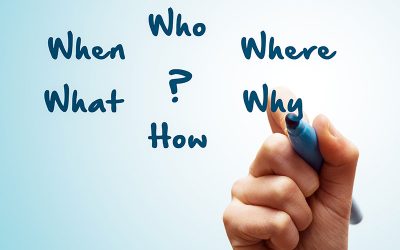Today, I’m reaching into my mailbag and replying to a question I received recently. Ed in Tampa asked:
“Hey Trish, this might sound like an obvious question, but you talk a lot about personal growth plans. What is that, and why do I need one?”
Thanks for asking, Ed. First of all, it’s not an obvious question. I encounter leaders all the time who may say they understand personal growth – and some may even have a ‘plan’ in place – but they don’t follow through, which tells me they’re not really aware of the purpose of a Personal Growth Plan (PGP). When we fail to plan our personal growth, or we don’t follow through on our commitments, we and everyone on our team is limited in growth potential and capacity for success.
What I learned about personal growth
One of my key takeaways learning about leadership under John Maxwell, is how often, when speaking about leadership, he talks about a daily growth plan. He keeps it simple, describing a personal, daily growth plan like this:
“Growth is made up of small, incremental changes. I want to help you develop the right attitude, learn more about your strengths, tap into your passion, become more in touch with your purpose, and develop your skills, so that you can be all you can be…” (John C. Maxwell)
John boils all that down into a one-sentence directive that all of us can benefit from, no matter where we are or what we’re doing in our lives and work. You don’t need a program or a seminar, a video series or a bookshelf full of advice. You just need to…
“Choose to become intentional about improving your life.” (JCM)
That simple, profound message really resonated with me, and I’ve seen the benefits of it in my own life and work, as I’ve seen it play out in countless other leaders around me. When we take time, every day, to invest in ourselves, we always begin the next day better prepared and more able to succeed.
Planning for Personal Growth
The first step in this process is the choice. Doing something different, something better and more enriching with our time … here’s the key … in place of something we’re already doing. It means change … and this is where many people get stuck. It’s hard to give up something comfortable and familiar. We have to know that choice is worth it and choose to act on that worth rather than our feelings.
There’s no denying that’s tougher to do than it is to say. If you are struggling with that choice, don’t beat yourself up. We are much more effective in making the right choices when we stop judging ourselves and start being more aware of ourselves and others around us. Awareness is about knowing where we want to go and learning how to get there. This process involves assessing our current choices and habits and determining if they are leading us closer to the goal or further away from it.
When we just “take life as it comes” and “react to what happens” this is not aware behavior.
Awareness looks ahead to the consequences of choices and honestly assesses what those results are likely to be. When we practice awareness, we discover how our current habits and choices either limit or expand our opportunities every day. Awareness reminds us that our choices today determine our opportunities tomorrow.
You may be thinking, “C’mon, Trish, then what’s the difference between ‘judging’ and ‘awareness’?”
Great question!
Judging decides based on how I feel about something I already did or didn’t do. It looks backwards to condemn me for past mistakes without any specific way to improve. Awareness looks ahead to open our eyes, minds and hearts to specific areas where we can make a difference, in ourselves and others. One leads to frustration and depression and regret. The other creates a list of action steps we can choose to take to make tomorrow better than today.
Judgement creates stagnation. Awareness creates engagement.
Choosing this approach to personal growth will mean your Personal Growth Plan will be different than someone else’s. And that’s good. A plan isn’t “good” for you just because it worked for someone else, and a plan isn’t “bad” just because it didn’t work for someone else.
Remember, the goal of your Personal Growth Plan is to better prepare you for tomorrow’s opportunities and to increase those opportunities. The steps to get there will be unique based on your situation and place in your journey. What worked for us before may not be the best plan for us now. That, again, is where awareness comes in.
When we ask ourselves, every day, what we can do today to improve ourselves for tomorrow, the answer is best when it includes the following questions:
- How will I acquire new information that increases my understanding?
- What better health choices will I make that improve my physical ability and capacity?
- How will I gain a better understanding of the strengths and needs of those around me?
When we choose to seek out new information, better habits and more understanding, we create specific opportunities to either choose to increase our leadership lid or stay the same. When we understand awareness in those terms, it helps motivate us to ask those questions more honestly and pursue the answers we create with more internal motivation to follow through on those answers.
If you have a question you would like for Trish to answer, comment below or send a private message through the contact form here.
How one small shift can cause a breakthrough: A Case Study
Communication problems are one of the greatest causes of poor morale, lack of productivity and failure with any team. When a leader models intentional listening, that shift will inspire their team to follow that lead, increasing that team’s capacity for success with...
How Autocratic Leaders Kill Communication: A Case Study
Good leaders understand the necessity of healthy lines of communication with their team. Sometimes, though, we get in our own way, stifling what might otherwise be a dynamic environment. Why does this happen, and how would a shift in thinking lead to better...
My Friend Deepak: A story about lost opportunities and second chances
All of us have disappointed ourselves, fallen short of a goal or made a promise we didn’t keep. While we all need to do our best to walk in integrity, sometimes we are too slow to let go of our failures. Too slow to set them down and carry only the lessons learned...
From autocrat to influencer: making the shift
As a leader, is it more important to get things done, or to develop a group of people who get things done? Our initial answer to this question says a lot about which method of leadership we tend to prefer: autocratic or influential. In a previous article, we looked at...
Pitfalls of an autocratic approach: A real world case study
What’s the best approach to leadership? Is there a time when being an autocrat is better than being an influencer? Sooner or later, every leader will need to address these questions. Is there an answer that applies to every situation, or are there exceptions? Good...
Why influential leaders inspire questions instead of answering them
You see it in kung fu movies, science fiction sagas and old-fashioned hero quests. The young adventurer encounters the wizened sage, hoping to receive answers to the questions that launched him on his quest. After a moment of bemused silence, the sage responds to the...








0 Comments